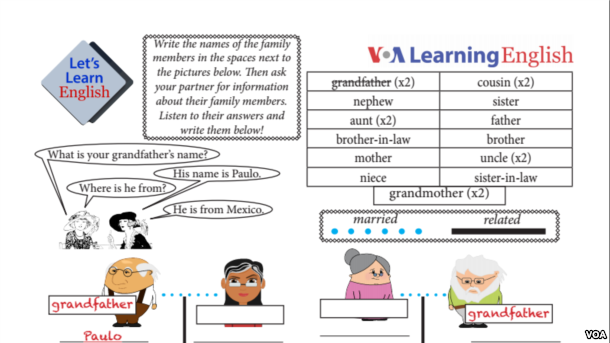- 简介
- 口语
- 发音
- 对话
- 写作
- 资料
Anna is feeling homesick. Marsha helps her by listening to her talk about her family.
In this video, learn to say the new words. Learn to ask a friend to talk about a problem. You can also download the worksheet and practice talking about your family.
?In this video, you ?learn about how Americans pronounce the word "aunt" in different parts of the country.
Let's Learn English Lesson 12: Meet My Family
Are you from a big family or a small family? Write to us to tell us about two people in your family. What do they do? What do they make? Click on the image below to download the Activity Sheet and practice with a friend.

Learning Strategy 学习技巧
Learning Strategies are the thoughts and actions that help make learning easier or more effective.
The learning strategy for this lesson is Find Patterns. Learning is easier when you can find and apply patterns. Here is an example.
Carlos is learning the names of family members in English. He sees a pattern. Some words change when you talk about the next generation. "Father" changes to "grandfather." When someone is related by marriage, the word "in-law" is used. "Sister" changes to "sister-in-law." Carlos thinks he can use this pattern to help remember the new words in English.
New Words 新词汇
clown - n. someone who often does funny things to make people laugh
different - adj. not ordinary or common; unusual
feel - v. used to describe or ask about someone's physical or mental state
garden – v. to work in a garden; to take care of the plants in a garden
guitar - n. a musical instrument that is held against the front of your body and that has usually six strings which are played with your fingers or with a pick
homesick - adj. sad because you are away from your family and home
joke - n. something said or done to cause laughter
laugh - v. to show that you are happy or that you think something is funny by smiling and making a sound from your throat
make - v. to build, create, or produce (something) by work or effort
park - n. piece of public land in or near a city that is kept free of houses and other buildings and can be used for pleasure and exercise
photo (photograph) - n. a picture made by a camera
raise - v. to keep and take care of (animals or crops)
remind - v. to cause (someone) to remember something
rodeo - n. an event in which people compete at riding horses and bulls, catching animals with ropes, etc.
sheep - n. an animal with a thick woolly coat that is often raised for meat or for its wool and skin
spoon - n. an eating or cooking tool that has a small shallow bowl attached to a handle
sweater - n. a warm usually knitted piece of clothing for the upper part of your body
Family Relationships
aunt - n. the sister of your father or mother or the wife of your uncle
brother - n. a boy or man who has one or both of the same parents as you
cousin - n. a child of your uncle or aunt
daughter - n. a female child
family - n. a group of people who are related to each other
father - n. a male parent
mother - n. a female parent
nephew - n. the son of your brother or sister
niece - n. a daughter of your brother or sister
sister - n. a girl or woman who has one or both of the same parents as you
son - n. a male child
uncle - n. the brother of your father or mother or the husband of your aunt
______________________________________________________________
Free Materials
免费学习辅助材料
Download the VOA Learning English Word Book for a dictionary of the words we use on this website.
Each Let's Learn English lesson has an Activity Sheet for extra practice on your own or in the classroom. In this lesson, you can use it to practice a conversation about activities.
For Teachers

教学辅助
See the Lesson Plan for this lesson for ideas and more teaching resources. Send us an email if you have comments on this course or questions.
Grammar focus: Auxiliary do and the verb makeTopics: Family members?; family relationships.,
Learning Strategy: Find and Apply Patterns
Speaking & Pronunciation Focus: Ask about a problem; varied ways to pronounce "aunt"